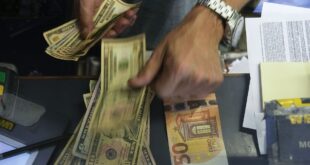The price of Bitcoin reached $97,000 on Thursday, climbing 4.54%, marking an all-time high for the crypto currency.
Bitcoin, considered part of the so-called ‘Trump trade’, has gathered pace since the US election outcome as investors have continued to gain confidence in political support for the crypto currency.
At the time of writing, its price was at $97,000 (around €92,000), climbing 4.54% on the day.
“Amid a relatively calm day for equities, investors’ attention was elsewhere on the markets as bitcoin edged ever closer to the magic $100,000 level,” Russ Mould, investment director at AJ Bell, said.
“Hitting an intraday high of $97,671, the cryptocurrency continues to climb as investors and traders anticipate big things in 2025,” he added.
Bitcoin surged before and after Trump’s victory in the US election, with its price soaring 35% in one month and 94% year-to-date as investors expect US cryptocurrency regulations to be more favourable under a Trump administration than under President Joe Biden.
A six-digit figure may not be far off
Trump has been notably pro-cryptocurrency, pledging at the Bitcoin 2024 conference to make the United States “the crypto capital of the planet” and position Bitcoin as a global superpower.
Trump also vowed to “appoint an SEC chair who will build the future, not block the future”.
While some analysts predict that Bitcoin could hit $100,000 (€92,000), others caution that Trump’s tariff policies could reignite inflationary pressures, potentially weighing on cryptocurrency markets.
Cryptocurrencies are seen as an alternative asset class, benefiting from an easing monetary environment with adequate liquidity, particularly during a rate-cutting cycle of central banks.
Simply put by Euronews’ market analyst Tina Teng: “Crypto assets tend to go up when interest rates go down; conversely, rising interest rates usually pressure these digital tokens.
“In a scenario where Trump imposes his pledged tariffs on other countries, we might see inflation re-elevate in the US and encourage the Federal Reserve to raise its interest rates again.”
 topnaijanews Stay informed with the latest Nigerian news at your fingertips
topnaijanews Stay informed with the latest Nigerian news at your fingertips
